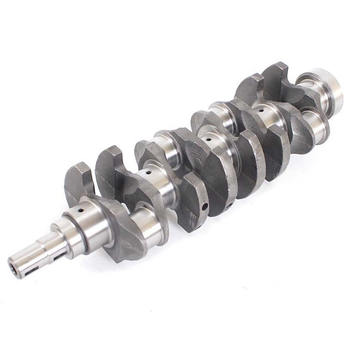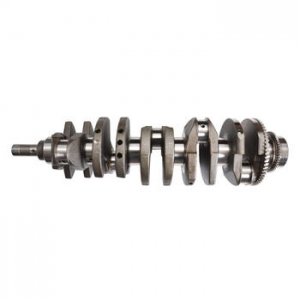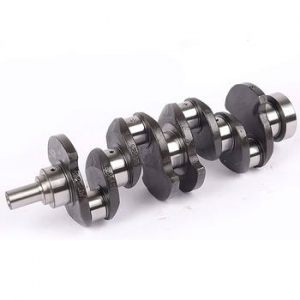Let's dive straight into the heart of the matter: the crankshaft for the Hyundai G4KH 2.0T engine, specifically the OEM part number 23110-32000. This isn't just another engine component; it’s the backbone that converts the linear motion of your pistons into the rotational force that drives your wheels. Understanding its role, its potential weaknesses, and why choosing the right replacement is crucial can save you a lot of headaches – and money – down the road. Think of it as the conductor of your engine's orchestra, ensuring all the parts play in harmony. A faulty crankshaft can throw the entire performance out of sync, leading to some serious problems.
Understanding the Hyundai G4KH 2.0T Engine and Crankshaft Function
The Hyundai G4KH 2.0T engine, found in various Hyundai and Kia models, is known for its performance and efficiency. At the core of this engine lies the crankshaft, a component tasked with a demanding job. The crankshaft receives the force generated by the pistons during combustion and transforms it into rotary motion. This rotary motion then powers the vehicle's transmission and ultimately, the wheels. Given the immense forces and stresses involved, the crankshaft needs to be incredibly durable and precisely manufactured. The OEM 23110-32000 specification ensures that the crankshaft meets these stringent requirements, guaranteeing proper fitment, material quality, and performance. It's not simply a matter of "a crankshaft is a crankshaft"; the specific design and materials used are tailored to the G4KH 2.0T's unique characteristics. It's like choosing the right tool for the job – a wrench is great, but it won't help you hammer a nail.
Common Issues and Symptoms of a Failing Crankshaft
Unfortunately, even the most robust components can fail over time. Crankshafts are subjected to extreme stress and wear and tear, and they can eventually develop problems. Some common issues include bearing wear, cracks, and even complete failure. Symptoms of a failing crankshaft can range from subtle to quite dramatic. Keep an eye out for things like unusual engine noises (knocking or tapping), vibrations, loss of power, and difficulty starting the engine. You might also notice metal shavings in the oil. These are all warning signs that something is amiss. Early detection is key, as neglecting these symptoms can lead to catastrophic engine damage, resulting in much more expensive repairs. Ignoring a crankshaft issue is akin to ignoring a toothache – it won't go away, and it will only get worse.
The Importance of OEM Replacement: OEM 23110-32000
When it comes to replacing a critical component like the crankshaft, choosing an OEM (Original Equipment Manufacturer) part is almost always the best strategy. In this case, the OEM part number is 23110-32000. OEM parts are manufactured to the exact specifications of the original part, ensuring a perfect fit and optimal performance. Aftermarket parts may be cheaper, but they often compromise on quality, materials, or precision. The potential risks of using a non-OEM crankshaft include reduced engine performance, increased wear and tear on other components, and even complete engine failure. Saving a few bucks upfront can end up costing you a lot more in the long run. Many professional mechanics will strongly advise against using anything other than the OEM spec when it comes to internal engine components – and for good reason. We, at our company, have seen countless examples of aftermarket parts failing prematurely, leading to unhappy customers and repeat repairs.
Materials and Manufacturing of the OEM Crankshaft
OEM crankshafts, like the 23110-32000 for the Hyundai G4KH 2.0T, are typically manufactured from high-strength forged steel. This material provides exceptional durability and resistance to wear and tear, crucial for withstanding the immense forces generated during engine operation. The manufacturing process involves precise machining and heat treatment to ensure dimensional accuracy and optimal hardness. Each crankshaft undergoes rigorous testing to meet strict quality control standards. This attention to detail guarantees that the OEM crankshaft will perform reliably and contribute to the overall longevity of the engine. The specific alloy used and the precision of the manufacturing are key factors in the crankshaft's ability to withstand the stresses of a high-performance engine. Why is this so important? Because a weaker crankshaft is far more likely to fail under the intense pressure of the G4KH 2.0T.
Installation and Maintenance Tips for Your Hyundai G4KH 2.0T Crankshaft
Proper installation and maintenance are critical for maximizing the lifespan of your Hyundai G4KH 2.0T crankshaft. Installation should always be performed by a qualified mechanic with experience working on this specific engine. Proper torque specifications must be followed when tightening the main bearing caps, and the correct type of lubricant should be used during assembly. Regular oil changes are also essential, as clean oil helps to reduce friction and wear on the crankshaft bearings. Monitoring your engine's oil pressure is another good practice, as low oil pressure can indicate bearing wear. A little preventative maintenance can go a long way in preventing costly crankshaft failures. And let's be honest, no one wants to tear down their engine just to replace a worn crankshaft prematurely. Ensuring proper lubrication and regular maintenance significantly extends the life of this vital component.
Real-World Applications and Case Studies
Consider a scenario where a Hyundai owner opted for a cheaper, non-OEM crankshaft during an engine rebuild. Within a few thousand miles, the engine began to develop a noticeable knock, and eventually, the crankshaft failed completely, causing significant damage to the engine block. This resulted in a much more expensive repair than if the owner had simply used the OEM 23110-32000 crankshaft in the first place. Another example involves a performance enthusiast who experienced recurring issues with engine vibrations after installing an aftermarket crankshaft. After switching to the OEM part, the vibrations disappeared, and the engine ran smoothly. These real-world examples highlight the importance of choosing the right parts and the potential consequences of cutting corners. Our experience has shown that opting for quality components, like the OEM crankshaft, ultimately saves time, money, and frustration.
Troubleshooting Common Crankshaft Problems
Diagnosing crankshaft problems can be tricky, as many of the symptoms can overlap with other engine issues. However, a systematic approach can help you pinpoint the problem. Start by checking the engine oil for metal shavings, which is a strong indicator of bearing wear. Next, listen carefully for any unusual engine noises, such as knocking or tapping. A compression test can help identify cylinder issues that may be related to crankshaft problems. Finally, consider a visual inspection of the crankshaft itself, although this usually requires removing the engine. Remember, if you're not comfortable performing these tests yourself, it's best to consult a qualified mechanic. A proper diagnosis is crucial for determining the appropriate course of action and avoiding unnecessary repairs. And if the crankshaft is indeed the culprit, replacing it with the OEM 23110-32000 is generally the most reliable solution.
Future Trends in Crankshaft Technology
The automotive industry is constantly evolving, and crankshaft technology is no exception. We're seeing advancements in materials, manufacturing processes, and designs aimed at improving performance, efficiency, and durability. Expect to see more crankshafts made from lightweight materials like titanium alloys, which can reduce engine weight and improve fuel economy. Surface treatments and coatings are also becoming increasingly common, enhancing wear resistance and reducing friction. Furthermore, advanced manufacturing techniques like additive manufacturing (3D printing) are being explored to create more complex and optimized crankshaft designs. These advancements promise to make future engines even more powerful, efficient, and reliable. The integration of sensors to monitor crankshaft health and detect potential problems early on is also a promising area of development. You might even see active crankshafts that can adjust their characteristics based on driving conditions.
Conclusion: Investing in Quality with the OEM Crankshaft
In conclusion, when it comes to the crankshaft for your Hyundai G4KH 2.0T engine, specifically the OEM 23110-32000, investing in quality is paramount. This component plays a crucial role in your engine's performance and reliability, and choosing the right replacement can make all the difference. While aftermarket options may seem tempting due to their lower prices, the potential risks and consequences far outweigh the savings. By opting for the OEM crankshaft, you're ensuring proper fitment, optimal performance, and long-term durability. Think of it as an investment in the health and longevity of your engine. Ultimately, the peace of mind and reliable performance that comes with using the correct, high-quality component is well worth the cost. Are you willing to risk the heart of your engine to save a few dollars? The answer, for most discerning car owners, is a resounding no.




